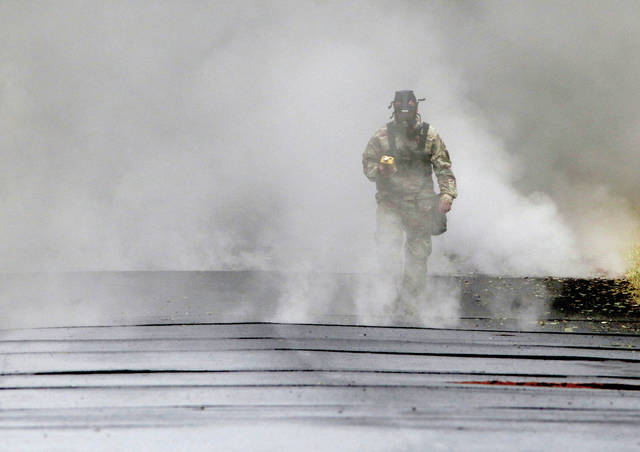As the number of those affected by the Leilani Estates eruption continues to rise, concerned citizens on and off the island are looking for ways to provide support.
Between large-scale organizations such as the Salvation Army and American Red Cross, community-based organizations and crowdfunding options, there are many ways for donations to reach victims. However, because many organizations have different donation requirements, donors are asked to be conscientious about what they donate.
The American Red Cross
“We’re not soliciting any in-kind donations,” said Coralie Matayoshi, CEO of the American Red Cross Pacific Islands region. “We’re really just looking for cash only.”
Matayoshi said the Red Cross cannot efficiently sort or distribute items, while financial donations can be easily directed to whatever is most needed.
The Red Cross is managing two emergency evacuation centers in Pahoa and Keaau. As of Tuesday afternoon, the Pahoa shelter had approximately 270 evacuees, while the Keaau shelter housed 15, said Roxcie Waltjen, director of Hawaii County Parks and Recreation. Both shelters are pet-friendly.
The Salvation Army
The Salvation Army’s Hawaiian and Pacific Islands Division is assisting with emergency disaster services to the two evacuation centers. These services include providing evacuees with three meals each day, hygiene items, physician and veterinary checkups and more.
Despite the large volume of food and supplies the evacuation centers require, Salvation Army spokesperson David Sayre said financial donations are preferable because the ongoing need for supplies has largely been fulfilled, and donations of items are time-consuming to sort and distribute.
However, he said, the Salvation Army has need of suppliers for meal services. Starting today, the Salvation Army will accept donations of large-volume meals from certified kitchens and restaurants.
Restaurants wanting to donate large-volume meals can call 756-0306.
For health and safety reasons, home-cooked meals cannot be accepted, Sayre said.
Salvation Army partnered with a sizable amount of businesses to assist with the donation process.
A partnership with First Hawaiian Bank established the Aloha for Hawaii Fund, which will support relief efforts for the Leilani eruption and the recent flooding on Oahu and Kauai. Residents can make donations to the fund at any of the 61 First Hawaii Bank branches in Hawaii, Guam and Saipan.
The bank also donated $50,000 to Child and Family Service to support displaced families.
Donations of $5, $10 or $20 will be accepted at any Foodland or Sack N Save location in Hawaii. These donations will go toward the Salvation Army’s emergency disaster services efforts.
Clothing manufacturer HiLife also will donate a portion of proceeds from its Kokua Collection clothing line to the Salvation Army.
People also can donate directly to the Salvation Army at hawaii.salvationarmy.com. Donors are able to specify whether their donation supports relief on Hawaii Island, Oahu, Kauai or all three.
Hawaii Food Basket
“We’ll accept pretty much any donations,” said Kristin Albrecht, executive director of the Hawaii Food Basket.
However, Albrecht said there are some donations that are needed more than others. Canned proteins — meats, stews, chili, etc. — are essential, as are cases of bottled water. Albrecht also said personal hygiene items are much appreciated, as is baking soda to modulate the pH balances of water catchment systems.
The Food Basket is partnering with the Bodacious Women community group to distribute resources among the communities affected by the eruption, Albrecht said.
Supplies can be donated to either of the Food Basket’s warehouses in Hilo or Kona. Financial donations also can be made at hawaiifoodbasket.org/donate.
Crowdfunding
As with many previous disasters, several crowdfunding campaigns were launched, ostensibly soliciting financial donations for families or individuals affected by the disaster.
However, Waltjen advises residents to treat such campaigns with caution, as they can be fraudulent attempts to take money from the sympathetic and gullible.
While some crowdfunding campaigns are legitimate — such as one campaign by Major League Baseball player and former Hilo resident Kolten Wong — others only appear to be, thanks to photos pulled from social media. Would-be donors unsure of the legitimacy of a crowdfunding campaign are advised to err on the side of caution.
Crowdfunding platform GoFundMe established a list of confirmed legitimate Kilauea-related campaigns at gofundme.com/cause/hawaii-volcano.
Email Michael Brestovansky at mbrestovansky@hawaiitribune-herald.com






